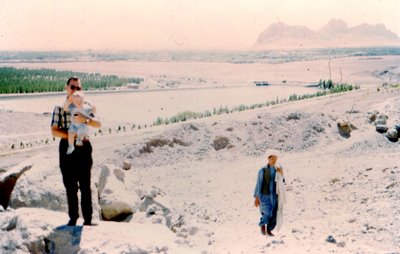Afghans and Insider Movements?
 For today's post, I refer to R-Liz and her salient comment and query from yesterday's post.
For today's post, I refer to R-Liz and her salient comment and query from yesterday's post. WOW! Thanks for this excellent question – Insider Movements is a terrific topic for on-going discussion, not just one post or a two-line answer to your comment (sorry!). There are several contextual levels with regards to ‘insider movements’. Which one are you referring to? This concept of missiology is quite complex.
Just Googling ‘Insider Movements’ can inundate you with a host of resources. One of the first to come up is a good, recent intro and pretty much gets to the heart of the matter – ‘Evaluating Insider Movements’, C5 (Messianic Muslims)’, St Francis Magazine Nr 4, 2006. Just the footnotes alone are worth their weight in resource material.
Reading through the descriptions of the models of contextualisation as described by John Travis in this article, I have seen elements practiced from each of these models, depending upon the Muslim countries and communities I’ve been in (Pakistan, India, Thailand, Egypt). One could argue that some of these models are also operating in non-Muslim cultures where I have worked and now live. Look at how Christianity as a religion has splintered off in America, for instance with it’s many indigenous forms of denominationalism, which frankly do not have much relevancy in other parts of this great world God created.
As with any missiology method, the proof of the pudding will be in the rate of attrition. What state of affairs have missionaries left ‘their mission’ in when it was time for them to pack up and go back home? How effectively is the mission integrating the Gospel of Christ with those who live and breathe in the culture to which they are born? Sounds so simple, doesn’t it? We can get terrific glimpses of this through the very first models of ‘Insider Movement’ given to us by the Apostles Peter and Paul – their cultural differences offer plenty for us to learn from! Hmmm ... I wonder what they would think of all these paradigms and terminologies?
Sometimes I feel that our American approach to foreign missions has resembled a Marine Commando mission. In our patriotic passions, we have gone OTT to preach our American idealism more than the ideals of Christ. The conversion is incomplete if Americanism is not in evidence. It’s easy to do. Why? Because our American culture has become as much a part of our ‘religious fabric’ as an Afghan’s culture is a part of theirs (i.e., we think we are the only ones who know more than the Brits or other Western nations what freedom is all about.) Reverse the scenario. Have a Moslem from Afghanistan come into your hometown and begin his mission programme on you. How would you react? What parts of this mission programme would you react the most negatively/positively to?
My feeling is that until one has lived in another culture and tasted the bread of those who suffer or survive differently, the homework is incomplete. It helps tremendously for the Christ follower to get to know the people with Christ’s love first, without wearing ‘Christian’ or religion on one's shirtsleeves. Gaining a respect for their history and how it parallels the development of the universality of the Christian church goes hand in hand. The task is a bit presumptuous to decide from afar on some church board or missions committee as to which method would get Christ’s approval. When you are there, amongst the people in their world, Christ will lead you in the way he and the Holy Spirit deem best for the Kingdom.
Presently, my concern is that the international political community – and in particular the American government under the leadership of the Bush administration and stoked by America’s religious right interest groups – is going to try to reconcile religious dilemmas by using Marine Commando tactics, thereby endangering many lives – both Afghan and Allied – in the process. They will undoubtedly, through their rhetoric and reactionary hubris, politicise it all in the name of ‘fighting terrorism’ and by demanding that the ‘universal freedom of religion’ be adhered to – or else! And then when it all goes pear-shaped deem the losses as mere ‘collateral damage’.
A couple of points:
- Afghans translate ‘freedom of religion’ as written in the Afghan Constitution (penned eons ago, not this latest UN attempt), as meaning foreigners in Afghanistan are free to practice their religious beliefs, quietly, and out of earshot of any Afghan. So this law exists, then, for the foreigner whose universal ways corrupt the spiritual path of the Afghan.
- For the Christian, the unforgivable sin is to renounce faith and belief in God and by extension, the Triumvirate. The Christian is bound by this law (which we see as freedom) as intrinsically as the Afghans are bound by their belief in Allah (God), which they also perceive as freedom.
- When Christians decide to turn away from their faith, they can be tolerated by others as backsliders, embraced by their world, and wait awhile before being renounced by God on the Day of Judgement.
- When Afghans decide to turn away from their faith, they are immediately renounced by their world and Allah. They are considered dead and any association with them is unclean and corrupt.
- When outsiders push the Afghans into a corner, they dig their heels in and fight back.
Ah, so much to discuss! Any other thoughts out there?
(Today's picture is of my father and baby brother, shortly after our arrival to the Kandahar landscape. Courtesy of our family photo album.)


